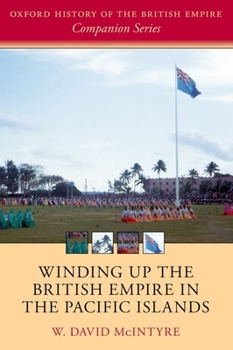Winding Up the British Empire in the Pacific Islands
(Part of the Oxford History of the British Empire Companion Series Series)
Little has been written about when, how and why the British Government changed its mind about giving independance to the Pacific Islands. Using recently opened archives, Winding Up the British Empire in the Pacific Islands gives the first detailed account of this event. As Britain began to dissolve the Empire in Asia in the aftermath of the Second World War, it announced that there were some countries that were so small, remote, and lacking in resources that they could never become independent states. However, between 1970 and 1980 there was a rapid about-turn. Accelerated decolonization suddenly became the order of the day. Here was the death warrant of the Empire, and hastily-arranged independence ceremonies were performed for six new states - Tonga, Fiji, Solomon Islands, Tuvalu, Kiribati, and Vanuatu. The rise of anti-imperialist pressures in the United Nations had a major role in this change in policy, as did the pioneering examples marked by the release of Western Samoa by New Zealand in 1962 and Nauru by Australia in 1968. The tenacity of Pacific Islanders in maintaining their cultures was in contrast to more strident Afro-Asia nationalisms. The closing of the Colonial Office, by merger with the Commonwealth Relations Office in 1966, followed by the joining of the Commonwealth and Foreign Offices in 1968, became a major turning point in Britain's relations with the Islands. In place of long-nurtured traditions of trusteeship for indigenous populations that had evolved in the Colonial Office, the new Foreign & Commonwealth Office concentrated on fostering British interests, which came to mean reducing distant commitments and focussing on the Atlantic world and Europe.
Format:Hardcover
Language:English
ISBN:0198702434
ISBN13:9780198702436
Release Date:May 2014
Publisher:Oxford University Press
Length:298 Pages
Weight:1.35 lbs.
Dimensions:1.1" x 6.4" x 9.4"
Customer Reviews
0 rating





